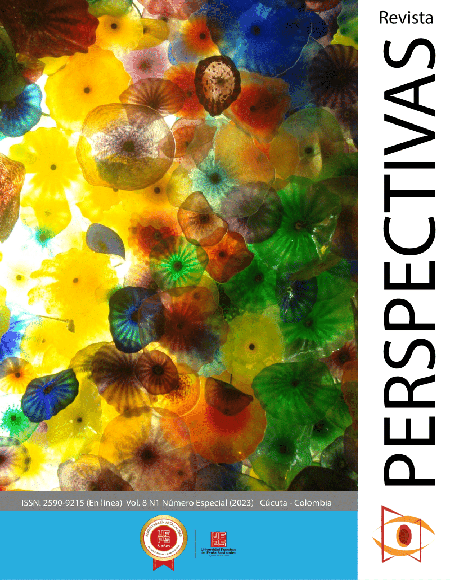Social movement, youth participation in the youth of the city of Cúcuta (Norte de Santander).
Movimiento social, participación juvenil en las juventudes de la ciudad de Cúcuta (Norte de Santander)
Main Article Content
Young people have championed different struggles and social movements, their participation is inherent to their own nature and their own development. From the Youth Statutory Law, participation and representation scenarios are defined for young people in their participation in the political and social life of the territorial Entity to which they belong. Given this scenario, the study is derived from the research project on the "Social Movement in youth participation as an exercise to strengthen youth in the city of San José de Cúcuta”. It was developed from the action research approach with the fundamental objective of studying the participation of young people from Cucuta in social movements, defining from the diagnosis the context and panorama in which they develop, seeking to strengthen their participation, revitalizing the scenarios. of participation and making a reading from the theoretical approaches from its organization, also generating spaces for dialogue and training with secondary school youth, in favor of the activation of the Municipal Network of Ombudsmen and Comptrollers. The main stage of development of the Study was the Youth Development Undersecretary. The results of the study addressed the following categories: * The Diagnosis of the context of the youth of Cucuta around the spaces and activities of participation, observing the absence of formalization of the same spaces that the Law establishes for youth. * The revitalization of the social and youth movement, where the youth participation subsystem was addressed from the action and youth assemblies were developed, generating an organizational structure that was endorsed by the youth. * The strengthening of the youth organization, where the organization of two youth organizations was directly intervened and the Volunteering "Territories drawing citizen identity" was created and * The promotion of youth participation from an early age, with the Association of secondary students are defined two initiatives: the great secondary school dialogue and the school government school. Training, education and scenarios that allow dialogue among young people are essential in the dynamics of youth participation in movements and social organizations that promote social transformation, the defense of human rights, social justice and work for the community
Downloads
Article Details
Aguilar, M. y Ander-Egg, E. (1999). Diagnóstico social Conceptos y metodología. Grupo Editorial Lumen Humanitas
Aranda, J. (2000) El Movimiento Estudiantil y la Teoría de los Movimientos Sociales. Convergencia (21), 225-250
Botero, P. y Torres, J. (2008). Perspectivas teóricas para comprender la categoría participación ciudadana-política juvenil en Colombia. Revista Latinoamericana de Ciencias Sociales, Niñez y Juventud, 6(2),565-611 http://www.redalyc.org/articulo.oa?id=7 7360205
Cardona, J. (2019). Participación política juvenil en el posacuerdo: una mirada a los casos de los municipios de San Carlos y de San Francisco en el departamento de Antioquia, en Colombia. Hallazgos, 16(31), 17-40. DOI: https://doi.org/10.15332/s1794-3841.2 019.0031.01 DOI: https://doi.org/10.15332/s1794-3841.2019.0031.01
Circa, Y. (2015) Los movimientos sociales y sus acciones de paz: estado actual de la participación de los movimientos sociales juveniles y culturales en procesos de paz de la región de Sumapaz (BOGOTÁ D.C.) [Tesis de especialización, Universidad Nacional de Colombia]. Base de datos Universidad Nacional de Colombia
DANE. (2021). Boletín Técnico Gran Encuesta Integrada de Hogares (GEIH) Octubre - diciembre 2020. https://www.dane.gov.co/files/investiga ciones/boletines/ech/juventud/Bol_eje_juventud_oct20_dic20.pdf
Gallardo, Y. y Moreno, A. (1999). Recolección de la información. Aprender a investigar. ICFES
Juventud Comunista Colombiana [JUCO]. (2008, febrero). Estatutos
Kärner, H. (1983). Los movimientos sociales: revolución de lo cotidiano. NUEVA SOCIEDAD. 64. 25-32
Lenin, V. (2010). ¿Qué hacer? Ministerio del Poder Popular para la Comunicación y la Información de Venezuela
Lenin, V. (1904). Carta a un camarada acerca de nuestras tareas de organización. Editorial Progreso URSS
Ley 1622 de 2013. (2013, 29 de abril). Congreso de la República. Diario Oficial No. 48.776
Ley 1885 de 2018. (2018, 1 de marzo). ). Congreso de la República. Diario Oficial No. 50522
Marx, K. y Engels, F. (2011). El Manifiesto del Partido Comunista. Centro de Estudios Socialistas Carlos Marx DOI: https://doi.org/10.9771/gmed.v2i2.9595
Marx, K. y Engels, F. (2010). Tesis sobre Feuerbach y otros escritos filosóficos. Fundación Editorial El perro y la rana
Merlucci, A. (1999). Acción colectiva, vida cotidiana y democracia. El Colegio de México
Oraisón, M. (2009). Participación, escuela y ciudadanía: perspectiva crítica y praxis política [Artículo científico, Universidad Nacional de Nordeste (UNNE) Argentina]. http://dx.doi.org/10.12795/IE.2009.i68. 04
Richmond, M. (1917). Diagnostico Social. Universidad de Costa Rica. www.ts.ucr.ac.cr/ts.php
Stalin, J. (1924). Los Fundamentos del Leninismo. La caja de herramientas, biblioteca virtual UJCE
Touraine, A. (2006). Los Movimientos Sociales. Revista colombiana de sociología. (27). 255-278
Vargas, J. (2003). Teoría de la acción colectiva, sociedad civil y los nuevos movimientos sociales en las nuevas formas de gobernabilidad en Latinoamérica. Espacio Abierto, 12(4), 523-537







